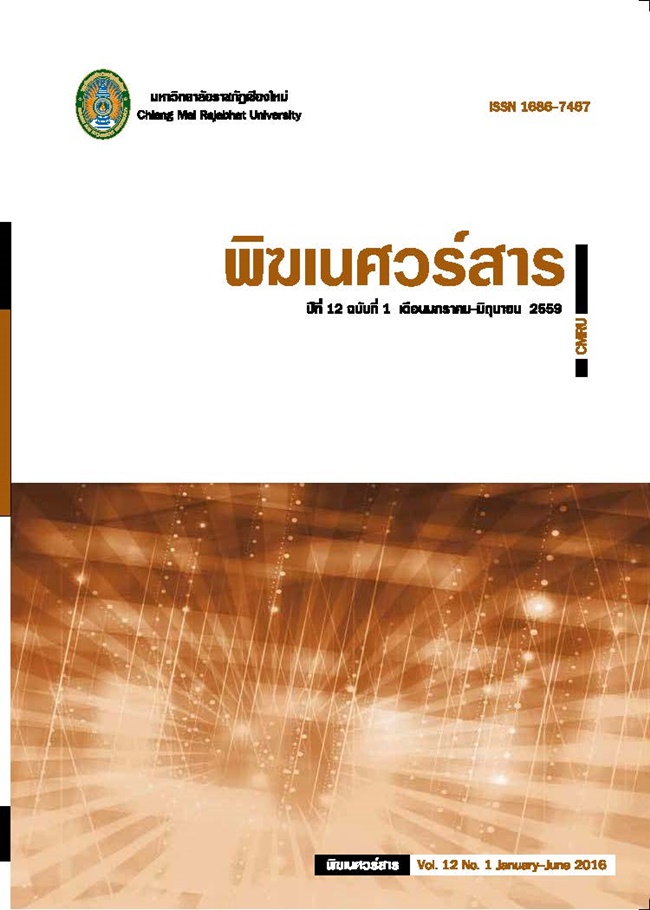กระบวนการจัดการศึกษาแบบมีส่วนร่วมเชิงพุทธของโรงเรียนวัดท่าตุ้ม อำเภอป่าซาง จังหวัดลำพูน
Main Article Content
Abstract
การศึกษาเรื่อง “กระบวนการจัดการศึกษาแบบมีส่วนร่วมเชิงพุทธ ของโรงเรียนวัดท่าตุ้ม อำเภอป่าซาง จังหวัดลำพูน” มีวัตถุประสงค์ 1) เพื่อศึกษาแนวคิดการจัดการศึกษาแบบมีส่วนร่วม 2) เพื่อศึกษากระบวนการจัดการศึกษาแบบมีส่วนร่วมเชิงพุทธ ของโรงเรียนวัดท่าตุ้มและ 3) เพื่อศึกษาผลของกระบวนการจัดการศึกษาแบบมีส่วนร่วมเชิงพุทธของโรงเรียนวัดท่าตุ้ม โดยเลือกการวิจัยเชิงคุณภาพใช้วิธีเก็บข้อมูล 3 วิธีคือ วิธีจัดการประชุม วิธีการสังเกต และวิธีการสัมภาษณ์แบบเจาะลึก
ผลการศึกษา พบว่า แนวคิดการจัดการศึกษาแบบมีส่วนร่วมระหว่างโรงเรียนวัดท่าตุ้มกับชุมชน 3 กลุ่ม มี 3 แนวคิดคือ แนวคิดเกี่ยวกับความเสียสละ แนวคิดเกี่ยวกับความเป็นกัลยาณมิตรและแนวคิดเกี่ยวกับผู้มีจิตอาสาและจิตสาธารณะ ส่วนกระบวนการจัดการศึกษาแบบมีส่วนร่วมเชิงพุทธของโรงเรียนวัดท่าตุ้มกับชุมชน พบว่า ชุมชนมีส่วนร่วมกับโรงเรียน 4 ด้าน คือ 1) การมีส่วนร่วมในด้านร่วมวางแผน 2) การมีส่วนร่วมในด้านคิดและตัดสินใจ 3) การมีส่วนร่วมในด้านร่วมดำเนินการหรือลงมือปฏิบัติ และ 4) การมีส่วนร่วมในด้านร่วมประเมินผลการดำเนินงาน
ผลที่เกิดจากกระบวนการจัดการศึกษาแบบมีส่วนร่วมเชิงพุทธของโรงเรียนวัดท่าตุ้ม พบว่า ผลที่ได้รับมี 2 ลักษณะคือ ลักษณะที่เป็นรูปธรรมอันได้แก่ โรงเรียนได้อาคารเรียนหลังใหม่ และมีคอมพิวเตอร์ใช้สอนทุกห้องเรียน ส่วนลักษณะที่เป็นนามธรรม อันได้แก่ ความภาคภูมิใจที่โรงเรียนผ่านการประเมินเป็นโรงเรียนส่งเสริมสุขภาพระดับทอง และนักเรียนชั้นประถมศึกษาปีที่หก สอบเข้าเรียนต่อระดับมัธยมศึกษาในโรงเรียนที่มีชื่อเสียงของจังหวัดลำพูน
ผลพลอยได้ที่เกิดจากการมีส่วนร่วมของชุมชน ๓ กลุ่ม พบว่า ได้เข้ามามีส่วนร่วมตามภารกิจของโรงเรียน 4 ด้านหลัก คือ 1) ด้านวิชาการ 2) ด้านงบประมาณ 3) ด้านบริหารงานบุคคล และ 4) ด้านบริหารงานทั่วไป และยังพบอีกว่าชุมชนมีส่วนร่วมมากที่สุดคือ “ด้านบริหารงานทั่วไป” ด้านวิชาการและด้านงบประมาณมีส่วนร่วมรองลงมา ส่วนด้านบริหารงานบุคคล ชุมชนมีส่วนร่วมน้อยที่สุด
THE BUDDHIST APPROACH TO THE PARTICIPATION IN EDUCATION MANAGEMENT PROCESS OF WAT TATUM SCHOOL, PASANG DISTRICT, LAMPHUN PROVINCE
The dissertation entitled “The Buddhist Approach to the Participation in Education Management Process of Wat Tatum School, Pasang District, Lamphun Province” consists 3 objectives as: 1.) to study the concept of educational participation management, 2) to study the process of Buddhist participatory management of Tatum School and 3) to study the results of the Buddhist participatory education management of Wat Tatum. This research was conducted by the qualitative research and data were collected from the Working Group Meeting, Observation and In-depth Interview method.
The results revealed that the participation in educational management of Wat Tatum School and three communities was found three concepts viz., 1) the concept of generosity, 2) the concept of friendship or Kalyanamitta and 3) the concept of public consciousness or public mind. Regarding to the participation in educational management of Wat Tatum School and the communities, it was found that those communities have participated in 4 aspects as: 1) participation in planning, 2) participation in the conception and decision making, 3) participation in the operation or proceeding and 4) participation in the evaluation of the operation.
However, the participation in educational management of Wat Tatum School resulted in 2 manners viz.
The outgrowth at the base of the three communities participating, it was found that the people of those communities have participated in 4 aspects, In addition, they also have participated in the 4 missions of the school viz., 1) Academic, 2) Budget, 3) Human Resource Management and 4) General Administration. It was also found that the school has built new buildings and every room is equiped with computers for multimedia teaching. The school is very proud that is has won the gold award for progress and sends its graduates to the best secondary schools in Lamphun Province.
Moreover, the authority of the Educational School Committees by the law is referred to the management role with school, but, in fact, they did not limit their administrative authorities, but also took part in actions. According to the Buddhist Doctrines concerning the participatory in the education management, they are: - Sangahavatthu: virtues making for group integration and leadership, Disa: directions, Aparihaniyadhamma: things leading never to decline but only to prosperity, Saraniyadhamma: states of conciliation and Kalyanamitta-dhamma: qualities of a good friend
Downloads
Article Details
The articles published are copyrighted by the Graduate School, Chiang Mai Rajabhat University.
The opinions expressed in each article of this academic journal are solely those of the individual authors and do not reflect the views of Chiang Mai Rajabhat University or its faculty members. The responsibility for the content of each article rests entirely with the respective authors. In the event of any errors, the authors alone are responsible for their own articles.


